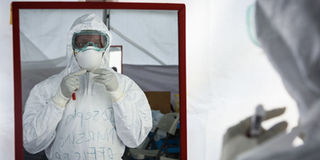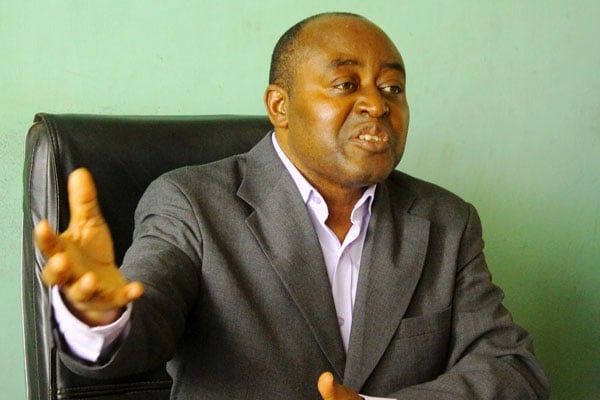Ebola: Government vaccinates 2,000 health personnel

A member of the medical staff of the Ebola Treatment Unit (ETU) gets ready as she checks her Personal Protective Equipment (PPE) in front of the mirror during a weekly rehearsal at the Bwera General Hospital in Bwera bordering with DRC, western Uganda, on December 12, 2018. AFP PHOTO
What you need to know:
Victims. Number of health workers who have died of Ebola in DR Congo, according to Dr Miriam Nanyunja, the World Health Organisation disease prevention and control adviser is 17
Kampala. At least 2,000 frontline health workers in the seven high risk districts, including Kasese, Bundibugyo and Ntoroko have been vaccinated against the deadly Ebola disease as a preventive measure against the disease that has ravaged neighbouring DR Congo (DRC).
Speaking at a press conference in Kampala yesterday, Dr Ruth Jane Aceng, the Health minister, said the health workers are at high risk of acquiring the disease as they are more exposed considering the kind of work they do.
The vaccination against deadly Ebola haemorrhagic fever (EHF) kicked off in November and the Health ministry hopes to spread it to other districts, especially those prone to the infection.
“There are more 3,000 doses that have been promised and we hope to target more than seven districts,” Dr Aceng said as she ruled out presence of Ebola cases in the country.
Dr Miriam Nanyunja, the World Health Organisation disease prevention and control adviser, said 51 health workers have been infected in the DR Congo with 17 of them dead.
“Health workers are at high risk and from the information we get, none of these 51 infected workers was affected from working in the Ebola centre, all these were found in their normal health facilities. You treat someone thinking they have malaria meanwhile you end up getting Ebola,” Dr Nanyunja said.
As of December 15, 531 Ebola cases had been confirmed in Congo with 313 deaths confirmed.
The first phase of Ebola preparedness that is soon ending has cost the government $19m.
Ahead of the presidential DR Congo elections, the Ministry of Health has intensified surveillance at the entry points into the country and has asked Ugandans to stay alert but observe calmness.
“DRC will be set to go to the ballot and hope all of you are taking an interest of what is happening in the DRC. Because when they go to the ballot and it does not go right, Uganda will have an influx of refugees. You cannot tell who is infected until they show symptoms so we must keep alert,” Dr Aceng said.
Ebola is transmitted from person-to-person via contact with blood or body fluids such as vomitus, faeces, saliva, urine, respiratory secretion and breast milk, especially when they contain blood.



